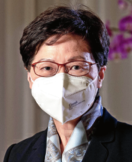Hong Kong leader slams malicious reports on virus battle
By WILLA WU in Hong Kong | CHINA DAILY | Updated: 2022-03-19 07:07

Hong Kong Chief Executive Carrie Lam Cheng Yuet-ngor has hit out at media reports disparaging the city's governing policies of "one country, two systems" and "patriots administering Hong Kong".
The central government's support for the Hong Kong Special Administrative Region as it battles its latest wave of COVID-19 "perfectly" illustrates the successful operation of the "one country, two systems" principle, she told China Daily in an interview on Thursday.
The city's leader made the remark in response to media claims that Beijing's support "undermines" the SAR's high degree of autonomy.
"It is exactly the opposite," Lam said, citing the example of the work done by Liang Wannian, head of the COVID-19 response expert panel under the National Health Commission, who was assigned to Hong Kong for pandemic control at Lam's request.
Liang did not impose the mainland's practices on Hong Kong, Lam said. Instead, following inspections of Hong Kong's pandemic facilities and consultation with local officials and front-line medical personnel, he devised a strategy suited to the city's actual situation-concentrating on preventing critical illness and reducing the number of fatalities.
Lam said that this clearly illustrated that Beijing's approach in helping Hong Kong showed respect for its high degree of autonomy, adding that help has been offered whenever Hong Kong has requested it.
She pointed out that the allegations show that although the National Security Law has been enacted in Hong Kong, elements remain, both in the city and overseas, that conspire to "smear the People's Republic of China and drive a wedge between the central government and the people of Hong Kong".
"That's why on the social media, you still see all these rumors, speculation and malicious comments about us getting help from the central government, about the mainland sending us supplies and medical personnel."
The city's leader cautioned that Hong Kong "should never underestimate that there are always malicious forces that want to undermine 'one country, two systems'".
Lam also blasted the claim that the city's pandemic control performance demonstrated the failure of "patriots administering Hong Kong", a guiding principle of the city's electoral reform.
"There was no truth in that sort of statement," she said, drawing on the example of how the city's 90 lawmakers, elected after the electoral reform, worked in concert with the government in approving anti-pandemic funding to help those in need.
Two rounds of anti-pandemic funds, worth over HK$30 billion ($3.84 billion), have so far been approved during the current fifth wave of the virus.
Meanwhile, the city's civil servants have been mobilized in the fight against the pandemic, Lam added. For example, the government's accountants have been sent out to the city's public housing units to help residents with virus testing and distribute supplies.
She also referred to the strong network at the district level, such as the Hong Kong Community Anti-Coronavirus Link, which the Hong Kong government relies on to mobilize front-line volunteers. "Because of the electoral reform, we now have a better basis to work together with different sectors of the community," she said.
Lam appealed to the people of Hong Kong to have confidence in the city, and also to have confidence in "one country, two systems", stressing that the central government is always there to help.
"Once you have confidence that better days are going to come, then you will have hope. And once you have hope, you will be able to stay strong during a crisis," she said.
Hong Kong is experiencing its worst wave of COVID-19 to date, with over 1 million cases reported since December.
So far, three teams of mainland medical experts have arrived in Hong Kong, assisting the city in areas such as testing and treatment of COVID-19. Meanwhile, large quantities of anti-pandemic supplies have arrived in Hong Kong from the mainland.

























